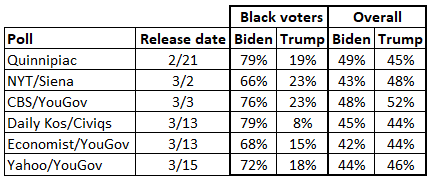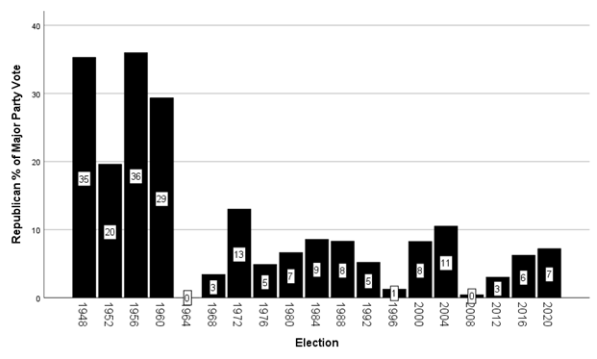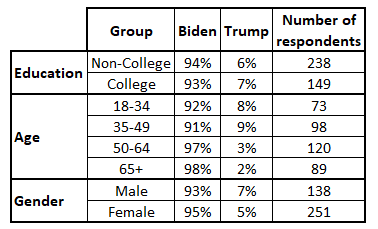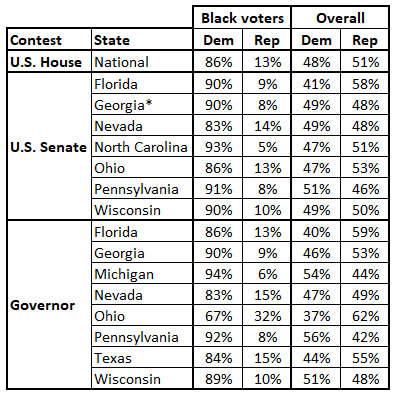KEY POINTS FROM THIS ARTICLE
— Part of former President Trump’s relatively strong polling against President Biden in both national and state polls is surprisingly robust support from Black voters.
— However, the Black vote has been overwhelmingly Democratic in presidential elections for more than a half century, and there has been little sign of major improvement for Republicans in recent elections.
— Exit polling from the 2022 midterms and turnout patterns from the 2024 primary season also call into question polling that shows Republicans on the verge of a big breakthrough with Black voters.
Black voters and the polls
Several recent national polls have shown Donald Trump running even or slightly ahead of Joe Biden in a one-on-one matchup. An average of most recent national polls as of Tuesday compiled by the website 270towin.com has Trump leading by a little under 1.5 points.
Several factors may explain why the former president, who is facing dozens of felony counts in various federal and state criminal trials, is running even or ahead of the current incumbent. A key reason, of course, is that despite the strong performance of the U.S. economy recently, voter perceptions of the economy have remained quite negative, and Joe Biden’s approval rating has been stuck for months in the upper-30s to low-40s.
Aside from negative perceptions of the economy, another major contributor to Biden’s deficit in the polls during 2024 has been his surprising weakness among Black voters—a group that has been a major source of support for him in the past including during his 2020 primary and general election campaigns. During the early stages of the 2020 Democratic primaries, Black voters in South Carolina provided Biden with a crucial boost after he had lost badly in Iowa and New Hampshire. Moreover, according to national and state exit polls, almost 90% of Black voters supported Biden over Trump in the general election. Yet several recent national and state polls have shown Trump making significant inroads among Black voters.
Table 1: Trump vs. Biden among Black voters in recent national polls

Note: Based on questions asking about support for major party candidates only.
Source: Polling data compiled by author
Table 1 displays the results of six recent national polls on the 2024 presidential race that provided breakdowns of candidate support by race. The overall results of these six polls were similar to those of other recent national polls with Trump leading in four of the six with an average margin of a little under 1.5 points. A good part of the reason for Joe Biden’s weakness in these polls is that his margin among Black voters was considerably smaller, on average, than his margin in 2020 and the margin that is typical for Democratic presidential candidates. Among Black voters who expressed a preference for either Biden or Trump in these recent polls, Trump’s share of the vote ranged from 9% in the Daily Kos/Civiqs poll to 23% in a couple of other polls, including the New York Times/Siena College poll—the one that probably attracted the most attention of any national poll in recent weeks.[1]
On average, Donald Trump received 18% of the vote from Black voters who expressed a preference for either Trump or Biden in the six national polls. If that result were to hold up in November, it would represent by far the highest level of Black support for a Republican presidential candidate in the past 60 years. Figure 1 displays the level of Black support for Republican presidential candidates since 1948 according to data from the American National Election Studies. According to these data, no GOP candidate since Richard Nixon in 1960 has won more than 13% of the Black vote with only Nixon in 1972 and George W. Bush in 2004 topping 10%. The average level of Black support for Republican presidential candidates in the 10 elections between 1984 and 2020 was just under 6%.
Figure 1: Republican percentage of Black vote for president, 1948-2020

Note: Click on image to see a larger version
Source: American National Election Studies
There is no evidence in the ANES data of any surge in support for Republican presidential candidates among Black voters in recent elections. According to the data from the 2020 American National Election Study, Donald Trump received only 7% of the Black vote against Joe Biden, which was almost identical to the 6% that he received against Hillary Clinton in 2016. Nor is there any evidence in the ANES data of a surge in support for Trump among any major subgroup of Black voters. This can be seen in Table 2, which displays the reported 2020 presidential vote among Black voters broken down by education, age, and gender.
Table 2: Black presidential vote in 2020 by education, age, and gender

Source: 2020 American National Election Study
The data in Table 2 show that, in contrast to the substantial class divide evident among white voters in recent elections, there was no difference between the preferences of college and non-college educated Black voters in 2020 with both groups overwhelmingly supporting Joe Biden. Nor is there any evidence of a gender gap or a surge in support for Donald Trump among younger Black voters. All major groups—college and non-college, young and old, male and female—reported voting overwhelmingly for Biden. Other sources show slightly different levels of Black support for Republicans: The national exit poll showed Trump getting 12% of the Black vote in 2020, while the Associated Press/Fox News VoteCast survey had him getting 8%. Regardless of the differences in these numbers, Black support for Trump was both low and within historical norms in 2020.
Is there any evidence that Black support for Democratic candidates has eroded since 2020? One place where we might expect to find such evidence would be in the 2022 midterm elections. Although Joe Biden was not on the ballot, midterm elections are always in part a referendum on the performance of the incumbent president, and that was clearly the case in 2022 as Republicans tried to tie Democratic candidates up and down the ballot to the unpopular Biden. In the end, the strategy did not work very well, and Democrats had a relatively successful midterm election, gaining two governorships and one seat in the Senate while losing only a handful of seats in the House.
Table 3: Black vote for Republican candidates in 2022 based on exit polls

Note: *Georgia Results shown for November election, not the subsequent December runoff.
Source: Exit poll results compiled by CNN
Table 3 displays the level of Black support for Democratic candidates for U.S. House and for Democratic Senate and gubernatorial candidates in the 2022 midterm elections according to exit polls. The data in this table show that with the exception of the Ohio gubernatorial election, the level of Black support for Republican candidates was consistently well below the 20% level seen in some recent 2024 polls. Leaving aside the Ohio gubernatorial race in which a very popular Republican incumbent won a landslide victory over a weak, underfunded Democratic challenger, the average level of support for Republican candidates among Black voters in 2022 was about 10%. This is very similar to the average level of support for GOP House, Senate, and gubernatorial candidates among Black voters over the past few decades.
One final piece of evidence concerning the possibility of a surge in support for Donald Trump and the Republican Party among Black voters is the turnout of Black voters in the 2024 Republican presidential primaries, especially in states with open primaries and large Black electorates such as South Carolina and Virginia. In these open primary states, Black voters would not have needed to be previously registered as Republicans in order to vote in the Republican primary.
If the Republican Party was experiencing a major surge in support among Black voters, we might expect to see an increase in the Black percentage of GOP primary voters compared with the minuscule level seen in 2020 and earlier years. However, the evidence from the 2024 exit polls shows no such surge in Black participation in Republican primaries. Black voters made up only 3% of Republican primary voters in South Carolina and only 4% of Republican primary voters in Virginia, according to the exit polls.
Additionally, and while there was no exit poll in Georgia this year, an analysis of official data from the Georgia Secretary of State by the Atlanta Journal-Constitution found that only 5% of Black voters participating in the presidential primary chose a Republican ballot while 95% chose a Democratic ballot. So whether based on the evidence from the 2024 exit polls (South Carolina and Virginia) or on analysis of which party ballot that Black voters chose in the recent presidential primary (Georgia), the GOP remains an overwhelmingly white party even in states where Black voters make up a large share of the overall electorate.
Discussion and conclusions
Recent national and swing state polls have shown surprisingly strong support for Donald Trump among Black voters. In the most recent New York Times/Siena national poll, for example, 23% of Black voters supported Trump over Joe Biden. If Trump actually receives 20% or more of the Black vote in the presidential election, this would represent a major breakthrough for the GOP. No Republican presidential candidate since Richard Nixon in 1960 has received anything approaching this level of support among Black voters.
The evidence presented in this article suggests that there are reasons to be skeptical about claims of an impending breakthrough for Trump and the Republican Party among Black voters. Based on evidence from the 2020 American National Election Study, there was no increase in the Republican share of the Black vote. Nor did the 2020 ANES show any significant divisions in the preferences of Black voters based on characteristics such as education, age, and gender. There was no evidence of a surge in working class support for the GOP among Black voters similar to that seen in recent elections among white voters.
Evidence from the 2022 elections also showed little evidence of any surge in Black support for Republican candidates. According to exit poll data from the 2022 House, Senate, and gubernatorial elections, the level of Black support for Republican candidates, approximately 10% on average, was similar to that seen in elections over the past few decades. In addition, evidence from exit polls on participation in the 2024 Republican presidential primaries also shows no evidence of any surge in support for the GOP among black voters. Even in states with open primaries with large Black electorates such as South Carolina and Virginia, the Republican primary electorate remained overwhelmingly white. Finally, an analysis of official data from the Georgia Secretary of State by the Atlanta Journal-Constitution found that only 5% of Black voters participating in the Georgia presidential primary chose a Republican ballot while 95% chose a Democratic ballot. Once again, the data show no evidence of a surge in support for the Republican Party among Black voters.
Of course, none of this evidence proves that there will not be a dramatic increase in Black support for Donald Trump and other Republican candidates in 2024—and even a small increase could be important given how close the key swing states could be in November. It is possible that recent national and swing state polls are picking up a trend that has only begun since the 2022 midterm election. Moreover, low rates of Black participation in this year’s GOP presidential primaries do not necessarily mean that Black voters will not support Donald Trump and other Republican candidates at increased levels in November. However, the evidence presented in this article does provide grounds for skepticism about claims of a dramatic surge in Black support for Donald Trump and the GOP in 2024. Acceptance of such claims should at least await better evidence from well-designed surveys with large sub-samples of Black voters or data from actual election results.
Footnote
[1] Some recent state polls have produced similar results. A Quinnipiac poll of voters in Michigan from earlier this month found Trump trailing Biden by only 68% to 19% among Black voters and a Mitchell Research poll in the same state that came out a few days ago found Trump getting an astonishing 33% of the Black vote to 58% for Biden. A Bloomberg/Morning Consult Poll of voters in Georgia released Tuesday found Trump trailing Biden by only 64% to 20% among Black voters. These levels of support for a Republican presidential candidate would be unprecedented in recent history.
| Alan I. Abramowitz is the Alben W. Barkley Professor Emeritus of Political Science at Emory University and a senior columnist with Sabato’s Crystal Ball. Despite being an emeritus professor, Abramowitz notes that he is still younger than both presumptive presidential nominees. His latest book, The Great Alignment: Race, Party Transformation, and the Rise of Donald Trump, was released in 2018 by Yale University Press. |
